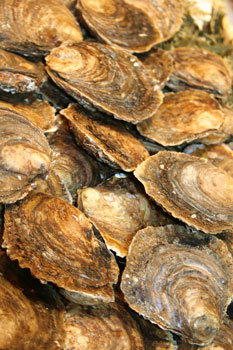Bivalves - June 2012

Supply of bivalve molluscs from exporting countries to the EU was good throughout 2011 and reached record figures, especially in the mussel sector. The economic crisis favoured the purchase of less commercially valued products and many consumers chose to buy frozen products.
Fisheries Commissioner, Maria Damanaki provided a boost for shellfish farmers in Europe when she encouraged the aquaculture sector to focus on organic aquaculture and ecolabelling and look towards “Green Aquaculture”. In this regard, a project is already underway at the Balearic Oceanography Centre at the Spanish Institute of Oceanography that is focussing on the concept of multitrophic aquaculture using molluscs as a method to reduce and minimize organic waste from aquaculture activities.
Recent food expos have provided opportunities for companies to promote new products. At Alimentaria Barcelona 2012, attendees were able to taste ready-to-eat products made from bivalve molluscs, such as Spanish paella and even mussel ice cream. At the Gulfood Expo in Dubai, the Scottish Shellfish Marketing Group (SSMG)promoted their range of mussel in sauce products. By focussing on value-added products companies can create new opportunities in the short term. The SSMG has seen the Middle East as an exciting new market for Scottish rope-cultivated mussels that could offer good potential for growth.
Mussel imports to the EU increased by 69.6% to 208 000 tonnes in 2011, a record according to data from the past five years. The increase was seen particularly in Italy, Netherlands and Spain. In 2011, Italy imported 58 300 tonnes of mussels compared with 38 500 tonnes in 2010, an increase of nearly 50%. In 2011, Spanish purchases of Chilean mussels rose by 70% in volume compared with the previous year, totalling 18 200 tonnes.
Exports of mussel from the Netherlands fell slightly from 461 tonnes in 2010 to 433 tonnes, with Belgium being the main destination with 277 tonnes.
Canned molluscs
Domestic consumption per capita in Spain fell for all seafood products, except for smoked fish, canned fish and seafood. According to ANFACO, Spanish canners had a reasonably good year as a result of the momentum of canned tuna and molluscs.
Exports of canned mussels in 2011 from Spain rose by 7.5% in volume from 1 214 tonnes in 2010 to 1 305 tonnes in 2011, and 10.3% in value, from EUR 5.3 million to EUR 5.8 million. Other molluscs (mainly cockles, clams and razor clams) recorded even higher increases, of 32.6% in export volume and 38.5% in sales.
Organic market for mussels
Ireland is trying to move into the organic market with their mussel production, which has adopted EU organic certification under Commission regulation 710/2009.
France produces 70 000 tonnes of mussels per year but demand is much higher. Therefore, the French market relies on imported products for more than 45% of market requirements. The main suppliers are the Netherlands, Spain, and Chile. Ireland is the third largest supplier of fresh mussels and Chile supplies frozen products.
Oysters
Oyster prices have doubled in six years because the volume of production has declined as a result of sanitary problems. Exports from France decreased in 2011 from 9 800 tonnes to 8 000 tonnes, the lowest since 2008. Other producers have filled the gap left in the market such as Mexico and Morocco. The production of oysters in Sonora, Mexico, grew by 30% compared with production during 2010.
In Namibia, plans are going ahead to develop 40-hectare oyster and abalone farm along the Walvis Bay coastline. In 8 months, oysters grow to market size of 100 grams per unit compared with the 18 to 36 months that it takes in other countries such as France.
European scallop market
In Europe scallop imports were dominated by the French market with 36 700 tonnes imported in 2011, Spain imported 9 800 tonnes and Belgium and Germany 3 500 tonnes each.
Outlook
Environmental problems such as the drought affecting Spain, France and Central Europe will influence sizes and volumes of molluscs available for next season. Red tides in Galicia estuaries have led to a ban on extraction of most of the mussel producing areas. The red tides appeared prematurely because of high temperatures and the absence of rains in February and March.
European producers will continue to differentiate their products through quality accreditation and certification, to distinguish them from imported products.

